|
Books Should Be Free Loyal Books Free Public Domain Audiobooks & eBook Downloads |
|
|
Books Should Be Free Loyal Books Free Public Domain Audiobooks & eBook Downloads |
|
Non-fiction |
|---|
|
Book type:
Sort by:
View by:
|
By: Cyril of Alexandria (376-444) | |
|---|---|
 That Christ Is One
That Christ Is One
Cyril of Alexandria was the leading voice of Nicene orthodoxy in the Christological controversies between Constantinople (381) and Chalcedon (451). Assuming the mantle of the Cappadotian fathers, he answered the auguments of Nestorius who had changed the liturgy of Constantinople by altering the prayer which referred to Mary as the Mother of God. Although he died seven years before the Council of Chalcedon, his writings and formulations heavily influenced not only Chalcedon, but the entire trajectory of orthodox christological thought. | |
By: D. B. Casteel (1877-1958) | |
|---|---|
 Behavior of the Honey Bee in Pollen Collecting
Behavior of the Honey Bee in Pollen Collecting
The value of the honey bee in cross pollinating the flowers of fruit trees makes it desirable that exact information be available concerning the actions of the bee when gathering and manipulating the pollen. The results recorded in this manuscript are also of value as studies in the behavior of the bee and will prove interesting and valuable to the bee keeper. The work here recorded was done by Dr. Casteel during the summers of 1911 and 1912. | |
By: D. H. Lawrence (1885-1930) | |
|---|---|
 Widowing of Mrs Holroyd
Widowing of Mrs Holroyd
Mrs. Holroyd is married to a loutish miner, who drinks, apparently patronizes prostitutes, and apparently brutalizes her. When a gentlemanly neighbor makes romantic advances to her, she wishes her husband dead. - Summary by Michele Eaton Cast List: Stage Directions: Scarbo Jack: silverquill Clara: Dtcastid Blackmore: MrsHand Mrs Holroyd: EltonTheSnowman Holroyd: alanmapstone Minnie: shreyasethi Grandmother: Availle Manager: ToddHW Rigley: alanmapstone First Bearer: Salvationist Laura: LaurenEmma3 Second Bearer: ChuckW | |
By: Dale Carnegie (1888-1955) | |
|---|---|
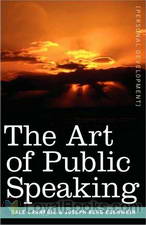 The Art of Public Speaking
The Art of Public Speaking
A great start to shaking off public speaking jitters, socializing and mastering the art of small talk. The principles of public speaking written by Dale Carnegie decades ago in this book are timeless. They are just as effective in working a crowd in today’s society as they were back then. He delves into ways of commanding and charming an audience with the right energy, tone of voice, pitch, pronunciation and vocabulary. Armed with the principles highlighted in this book, you can do more than convey a message to a group of people, you can move them... | |
By: Dame Shirley (d.1906) | |
|---|---|
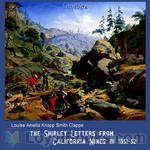 The Shirley Letters from California Mines in 1851-52
The Shirley Letters from California Mines in 1851-52
Louise Amelia Knapp Smith Clappe moved to California from Massachusetts during the Gold Rush of the mid-1800’s. During her travels, Louise was offered the opportunity to write for The Herald about her travel adventures. It was at this point that Louise chose the name “Shirley” as her pen name. Dame Shirley wrote a series of 23 letters to her sister Mary Jane (also known as Molly) in Massachusetts in 1851 and 1852. The “Shirley Letters”, as the collected whole later became known, gave true accounts of life in two gold mining camps on the Feather River in the 1850s... | |
By: Dan McKenzie | |
|---|---|
 City of Din
City of Din
A treatise on the increasing loudness of modern life, including philosophical and scientific discussion of what noise is, how effects us physically, mentally, and socially in cities, on railways, at home, in workplaces, and on battlefields of war. The book concludes with some strong suggestions for protecting ourselves from noise as well as for lessening noise altogether. - Summary by Amelia Chesley | |
By: Dante Alighieri (1265-1321) | |
|---|---|
 Epistolae, the letters of Dante
Epistolae, the letters of Dante
This volume contains the thirteen letters of the poet Dante Alighieri translated from their original Latin, including the famous and controversial letter to his patron Cangrande della Scala. The letters provide a good deal of context for the reader of Dante regarding his political and philosophical positions. In the final letter, the authenticity of which has been hotly contested by scholars, the author dedicates the Paradiso to the Veronese Cangrande, explains his Divine Comedy's title (then just Comedy), and discusses much of the work's content. | |
 Monarchia
Monarchia
The De Monarchia is one of the main works by Dante Alighieri. It is a treatise on secular and religious power, and more specifically on the relationship between secular authority (represented by the Holy Roman Emperor) and religious authority (represented by the Pope). The work is composed of three books, in which Dante condemns the theocratic conception of the power elaborated by the Roman Church and defends that both the Pope and the Emperor derive their power from God, and, that being so, God gave to each power in one certain area of life, which means they should not interfere with each other's power and one should not be considered above the other. | |
 Convivio
Convivio
Convivio (The Banquet) is a work written by Dante Alighieri roughly between 1304 and 1307. This unfinished work of Dante consists of four trattati, or "books": a prefatory one, plus three books that each include a canzone (long lyrical poem) and a prose allegorical interpretation or commentary of the poem that goes off in multiple thematic directions. The Convivio is a kind of vernacular encyclopedia of the knowledge of Dante's time; it touches on many areas of learning, not only philosophy but also politics, linguistics, science, and history... | |
By: David Barrows | |
|---|---|
 A History of the Philippines
A History of the Philippines
This book is one of the earliest studies of Philippine history by an American scholar. In preparation for this book, the author conducted ethnological studies of indiginous island tribes after the American war in the Philippines. Since this book was intended for the Philippine reader, the author nicely places the history of the Islands into the broader context of European and American history. | |
By: David Friedrich Strauss (1808-1874) | |
|---|---|
 The Life of Jesus Critically Examined
The Life of Jesus Critically Examined
Strauss was an early pioneer in the ongoing 'Quest of the Historical Jesus' held amongst New Testament scholars, and his Life of Jesus is one of the few landmarks in the field. The first edition of Strauss' book was published in Germany in 1835 when he was only 27 years old, and which by 1840 had gone through four editions. He focused his attention on battling two theological fronts which were current at the time - the traditional Orthodox who believed the miracles in the Gospels were to be taken as literal, yet supernatural, history; and the Rationalists, who believed that the Gospel miracles were all true but could be explained by natural and purely physical causes... | |
By: David Hilbert (1862-1943) | |
|---|---|
 Mathematical Problems
Mathematical Problems
Lecture delivered before the International Congress of Mathematicians at Paris in 1900 and subsequently published in the Bulletin of the American Mathematical Society Vol. 8 (1902), 479-481. | |
By: David Hume (1711-1776) | |
|---|---|
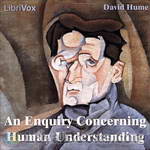 An Enquiry Concerning Human Understanding
An Enquiry Concerning Human Understanding
The Enquiry Concerning Human Understanding is a shortened and simplified version of Hume’s masterpiece A Treatise of Human Nature. It sought to reach a wider audience, and to dispel some of the virulent criticism addressed toward the former book. In it, Hume explains his theory of epistemology, and argues against other current theories, including those of John Locke, George Berkeley, and Nicolas Malebranche. | |
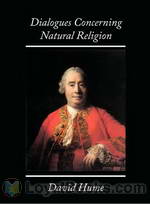 Dialogues Concerning Natural Religion
Dialogues Concerning Natural Religion
In Dialogues Concerning Natural Religion, philosopher David Hume examines whether belief in God can be rational. The work takes the form of a debate between three characters: Cleanthes, who argues that the existence and nature of God can be empirically verified; Demea, who argues that God is completely beyond human knowledge; and Philo, a philosophical skeptic widely thought to represent Hume’s own beliefs. Much of the debate centers around Cleanthes’ presentation of the analogical argument from design... | |
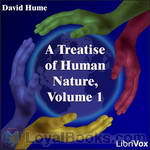 A Treatise Of Human Nature
A Treatise Of Human Nature
This book, published in two volumes called “books” by the author, is a treatment of everything from the origin of our ideas to how they are to be divided. It includes important statements of Scepticism and Hume’s experimental method. Part 1 deals with the nature of ideas. Part 2 deals with the ideas of space and time. Part 3 deals with knowledge and probability. Part 4 deals with skeptical and other systems of philosophy, including a discussion of the soul and personal identity.This is a recording of Volume I (or Book 1). Volume II (which contains Books 2 and 3) is in production at the moment. | |
 History of England from the Invasion of Julius Caesar to the Revolution of 1688, Volume 1A
History of England from the Invasion of Julius Caesar to the Revolution of 1688, Volume 1A
David Hume is one of the great philosophers of the Western intellectual tradition. His philosophical writings earned him lasting fame and renown; his historical writing earned his bread and butter. His "The History of England from the Invasion of Julius Caesar to the Revolution of 1688", published between 1754 and 1764, was immensely popular and Hume wrote that "the copy-money given me by the booksellers much exceeded any thing formerly known in England; I was become not only independent, but opulent... | |
 History of England from the Invasion of Julius Caesar to the Revolution of 1688, Volume 1C
History of England from the Invasion of Julius Caesar to the Revolution of 1688, Volume 1C
David Hume is one of the great philosophers of the Western intellectual tradition. His philosophical writings earned him lasting fame and renown; his historical writing earned his bread and butter. His "The History of England from the Invasion of Julius Caesar to the Revolution of 1688", published between 1754 and 1764, was immensely popular and Hume wrote that "the copy-money given me by the booksellers much exceeded any thing formerly known in England; I was become not only independent, but opulent... | |
By: David Marshall Brooks (1902-1994) | |
|---|---|
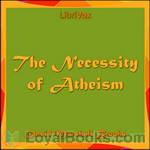 The Necessity of Atheism
The Necessity of Atheism
Plain speaking is necessary in any discussion of religion, for if the freethinker attacks the religious dogmas with hesitation, the orthodox believer assumes that it is with regret that the freethinker would remove the crutch that supports the orthodox. And all religious beliefs are "crutches" hindering the free locomotive efforts of an advancing humanity. There are no problems related to human progress and happiness in this age which any theology can solve, and which the teachings of freethought cannot do better and without the aid of encumbrances. | |
By: David Starr Jordan (1851-1931) | |
|---|---|
 Life's Enthusiasms
Life's Enthusiasms
The words in this essay on positive thought sing like those in Whitman's "Leaves of Grass." The author praises joyous living and recommends certain routes to its attainment. He explores schooling (public secondary and the university), travel, and the study of nature as ways to stay buoyant during life's trials. He also praises the power of the arts (literature, music, painting, sculpture) to keep spirits soaring. | |
By: David Walker (1796-1830) | |
|---|---|
 Walker's Appeal
Walker's Appeal
The Appeal grabbed readers’ attention in as dramatic a manner as Walker could have possibly imagined. In her book, Maria W. Stewart and the Roots of Black Political Thought, Kirsten Waters writes about how the pamphlet itself was viewed as dangerous by pro-slavery forces, while Walker actively worked to get his text in the hands of Black readers. He did not direct his writing to White audiences, and in the third edition added a special message to Black readers, saying that: It is expected that... | |
By: Delmer Eugene Croft | |
|---|---|
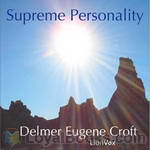 Supreme Personality
Supreme Personality
Life is self-realization. Every birth is divine. We are born anew every morning. My wish is that you may catch the gleam, be freed from limitations and enter upon your boundless possibilities. To bring you into the throne-room of your being, that you may awaken in self-realization, is why I have prepared this course of lessons. Should you give five minutes a day to them, in a year you will know the joy there is in Life, in Power, and in Service. (from the text) | |
By: Desiderius Erasmus (1466/69-1536) | |
|---|---|
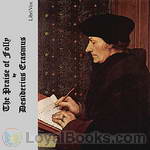 The Praise of Folly
The Praise of Folly
The Praise of Folly (Greek title: Morias Enkomion (Μωρίας Εγκώμιον), Latin: Stultitiae Laus, sometimes translated as In Praise of Folly, Dutch title: Lof der Zotheid) is a satirical essay written in 1509 by Desiderius Erasmus of Rotterdam (1466/69-1536). It is considered one of the most influential works of literature in Western civilization and one of the catalysts of the Protestant Reformation.It starts off with a satirical learned encomium after the manner of the Greek satirist... | |
By: Dillon Wallace (1863-1939) | |
|---|---|
 The Lure of the Labrador Wild
The Lure of the Labrador Wild
The Lure Of The Labrador Wild is a account of a expedition by Leonidas Hubbard, an adventurer and journalist to canoe the system Naskaupi River - Lake Michikamau in Labrador and George River in Quebec. His companions on this journey were his friend, New York lawyer Dillon Wallace and an Indian guide from Missannabie, George Elson. From the start, the expedition was beset with mistakes and problems. Instead of ascending the Naskaupi River, by mistake they followed the shallow Susan Brook. After hard long portaging and almost reaching Lake Michikamau, with food supplies running out, on September 15 at Windbound lake, they decided to turn back... | |
By: Dion Clayton Calthrop (1878-1937) | |
|---|---|
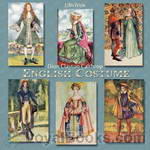 English Costume
English Costume
The world, if we choose to see it so, is a complicated picture of people dressing and undressing. The history of the world is composed of the chat of a little band of tailors seated cross-legged on their boards; they gossip across the centuries, feeling, as they should, very busy and important. As you will see, I have devoted myself entirely to civil costume—that is, the clothes a man or a woman would wear from choice, and not by reason of an appointment to some ecclesiastical post, or to a military calling, or to the Bar, or the Bench. Such clothes are but symbols of their trades and professions, and have been dealt with by persons who specialize in those professions. | |
By: Donald Alexander Mackenzie (1873-1936) | |
|---|---|
 Myths and Legends: Myths of Babylonia and Assyria
Myths and Legends: Myths of Babylonia and Assyria
Donald Alexander Mackenzie was a Scottish journalist and prolific writer on religion, mythology and anthropology in the early 20th century. His works included Indian Myth and Legend, Celtic Folklore and Myths of China and Japan.As well as writing books, articles and poems, he often gave lectures, and also broadcast talks on Celtic mythology.This volume deals with the myths and legends of Babylonia and Assyria, and as these reflect the civilization in which they developed, a historical narrative has been provided, beginning with the early Sumerian Age and concluding with the periods of the Persian and Grecian Empires... | |
By: Donald Ogden Stewart | |
|---|---|
 Perfect Behavior
Perfect Behavior
A humorous guide to manners and etiquette for ladies and gentlemen in a social "crises," published in 1922. (Introduction by Samanem) | |
By: Doris Stevens (1892-1963) | |
|---|---|
 Jailed for Freedom
Jailed for Freedom
A first-hand account of the 1913-1919 campaign of American suffragists, detailing their treatment at the hands of the courts, and the true conditions of their incarceration. | |
By: Dorothy Canfield Fisher (1879-1958) | |
|---|---|
 Home-Maker
Home-Maker
The Knapp family seems as though they ought to be happy, yet hidden frustrations are tearing them apart under the surface. As the family breadwinner, Lester Knapp drags himself reluctantly to his job each day, miserable in the harsh world of commerce and business, longing for a quiet life at home with his books. Meanwhile, Evangeline Knapp is admired as an excellent housewife, yet the limited challenges of that life are driving her to perfectionism and boredom. The Knapp children are affected by their parents' unhappiness, the youngest child acting out in frequent tantrums, and the two older children tense and nervous... | |
By: Dorothy Osborne (1627-1695) | |
|---|---|
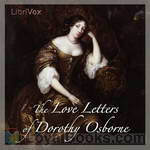 Love Letters of Dorothy Osborne
Love Letters of Dorothy Osborne
A lively, interesting and important collection of 17th century love-letters written by an English lady, against the background of the Civil War and the Restoration | |
By: Dorothy Quigley | |
|---|---|
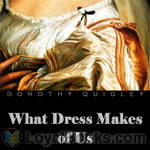 What Dress Makes of Us
What Dress Makes of Us
A wickedly funny book of advice on women’s dress. However old, fat or plain you are, Dorothy Quigley will tell you what not to wear. | |
By: Dr. Benjamin Rush (1746-1813) | |
|---|---|
 Inquiry into the Effects of Ardent Spirits upon the Human Body and Mind, with an Account of the Means of Preventing, and of the Remedies for Curing Them
Inquiry into the Effects of Ardent Spirits upon the Human Body and Mind, with an Account of the Means of Preventing, and of the Remedies for Curing Them
Written when the United States extended only to the Mississippi River, by one of the signers of the Declaration of Independence, this short work explores the physical, social, and mental effects of distilled liquors; the classes of people prone to intoxication by them; suggested drinks to use instead of them; and remedies for intoxication and for their habitual use. He takes a medical view of alcoholism, exploring the physical causes rather than blaming moral failure as the cause. Alcoholic drinks that are not distilled are viewed as wholesome drinks, and opium is suggested for pain as being without bad effects or addictive qualities. | |
By: Dreiser, Theodore (1871-1945) | |
|---|---|
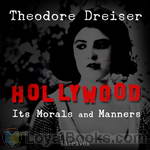 Hollywood: Its Morals and Manners
Hollywood: Its Morals and Manners
Serialized in Shadowland from November 1921 to February 1922, Hollywood: Its Morals and Manners is Theodore Dreiser's shocking four part expose on the motion picture industry. In it, he shares his observations from his extended stay in Los Angeles, and gives us an intimate look at the seedier underside of Hollywood. | |